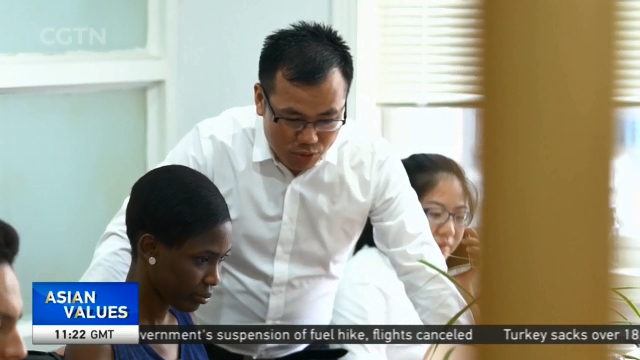
19:42, 08-Jul-2018
Doctrine of the Mean: 'Middle way' approach in Chinese business management
Updated
19:28, 11-Jul-2018
02:57

The Doctrine of the Mean has also been applied to the way Chinese businesses are managed. CGTN's Yang Chenxi takes a look.
Entrepreneur David Wang found himself faced with a problem.
DAVID WANG, GENERAL MANAGER SHANGHAI GREENWAVE ENVIRO-TECH "There was a time when one of my employees quit not long after he joined. He said he did not get what he expected from the job and he threatened me with a list of reparations."
Wang had legal weapons at his disposal to settle this dispute.
DAVID WANG, GENERAL MANAGER SHANGHAI GREENWAVE ENVIRO-TECH "I was appalled by his unreasonableness. It could have turned into a serious fight."
He was faced with two apparent choices. A, legal action, or B, caving in to avoid troubles.
BYRON LEE, ASSIST. PROFESSOR CHINA EUROPE INTERNATIONAL BUSINESS SCHOOL "What typical western thinking would say is: let's list out the cost and benefit of A, let's list out the cost and benefit of B, and then, based on this cost and benefit analysis, let's choose either A or B."
While he did not cave in to the threat, he didn't take it to the other extreme either.
DAVID WANG, GENERAL MANAGER SHANGHAI GREENWAVE ENVIRO-TECH "I chose to reason with him. I didn't feel like adding a new enemy."
YANG CHENGXI SHANGHAI "That was a classic showcase of the Asian value called the midway approach. The idea that the best solution is always somewhere in the middle. This philosophy in conflict resolution is like the age-old wisdom of the Yin and Yang, where you don't look at the matter in a linear fashion."
BYRON LEE, ASSIST. PROFESSOR CHINA EUROPE INTERNATIONAL BUSINESS SCHOOL "But as management has evolved, I think recently western management theory has started to acknowledge that the wisdom of the east is also a unique and maybe a more applicable way of looking at management problems."
DAVID WANG, GENERAL MANAGER SHANGHAI GREENWAVE ENVIRO-TECH "For example when I need to criticize an employee, I would find a way to make up for the loss of his or her face later. This is what Chinese employees expected of you."
40 years since China's reform and opening up, the country now has a modern business system. But traditional values like the midway approach continue to play their roles in corporate management. Under the philosophy, bosses are expected to communicate their demands in a way that is neither too strict nor too lenient. But while this helps with keeping harmony in the workplace, the indirect way of communication is something to get accustomed to for Wang's international staff.
BYRON LEE, ASSIST. PROFESSOR CHINA EUROPE INTERNATIONAL BUSINESS SCHOOL "If employees don't understand, then it definitely can be interpreted as a lack of principle."
DAVID WANG, GENERAL MANAGER SHANGHAI GREENWAVE ENVIRO-TECH "Foreigners are a lot more direct, and they don't want to guess your ideas. So I also need to change my communication style in front of them."
As multicultural work environments have become commonplace in many Chinese companies, experts say training is needed for the workforce to get a deeper understanding of the age-old business culture in China. YCX CGTN SHANGHAI.

SITEMAP
Copyright © 2018 CGTN. Beijing ICP prepared NO.16065310-3
Copyright © 2018 CGTN. Beijing ICP prepared NO.16065310-3